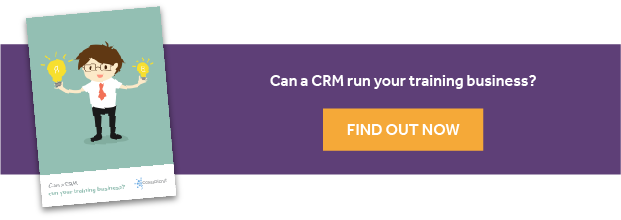7 Reasons Why a CRM Will Boost Your Sales and Marketing Campaign

|
7 ways a CRM will boost your sales and marketing efforts:
|
Are you getting the most out of your current CRM? Or have you yet to experience the joys of a unified hub that brings all the business benefits you’d expect from a tool designed to do much more than simply manage your customers. By combining the all-powerful forces of your sales and marketing departments, you’ll be able to create campaigns that have a genuine focus, that can deliver tangible results.
This post takes a look at what a CRM is and isn't and how it has changed sales and marketing for so many businesses.
What a CRM is
Let’s start with the basics, and look at what a CRM actually is (and, while we’re at it, what a CRM actually isn’t).
CRM is a customer relationship management tool; a piece of software that can be used to maintain your existing customer base, while aiding in the expansion of your business through new leads.
It helps modernise your operations and reduces the amount of time spent performing what amounts to basic data entry, leaving employees to concentrate on getting on with the job.
Boiled down to its essence, it’s a vast database of information, which helps you build and develop relationships with individuals (usually prospects and existing customers).
What a CRM isn’t
A CRM isn’t, right off the bat, a substitute for a dedicated training management system, given that a TMS is designed to support, automate and manage training courses for both you and your delegates, while a CRM is built to deliver an integrated solution from your initial sale to on-going customer management and retention.
So a CRM does a lot of the heavy lifting, automating many admin tasks, and collating incredibly important data. And all that, frankly, runs the risk of becoming a tad…inhuman and impersonal. Rather than using the CRM to start an actual conversation, some companies use the CRM to engage in a monologue with customers. A grey, dull, cookie-cutter monologue that seemingly never ends, never goes anywhere, and absolutely never engages anyone.
As you know, that’s a real misuse of a powerful resource.
There’s a lot more under the bonnet of a CRM platform than the ability to spam customers’ inboxes with your latest unfocused email campaign.
Recommended read: Can a CRM run your training business?
How CRM changed marketing
Your customers are a pretty interesting bunch – but until CRMs became widespread, those insightful behaviours and nuanced decisions made by customers were lost (unless you surveyed them all and saved your findings in an Excel spreadsheet or an A4 notepad). All the data, which might’ve informed how your company grows, whether it’s re-evaluating your product or targeting a new demographic, was wasted.
That’s not the only waste that CRMs have helped systematise. Consider something like lead management: In the days prior to CRMs, generating new leads could take months, as salespeople scour for the right customers, while potential customers get lost in the sales pipeline. You could send out a million emails (all the same, of course) and get precisely zero responses. All of that costs time, as well as money.
Actually, that’s the biggest benefit of a CRM: Streamlining the sales and marketing process. In return, that offers the power to expand a business.
The advent of CRM software has allowed sales and marketing teams to gain real insights into who their customers are, what they’re looking for, and how they go about finding it. Don’t get us wrong, marketing still requires great intuition and an understanding of people to deliver outstanding results – but a CRM is a tool that helps drill down on those insights that salespeople and marketers are already blessed with.
In fact, we’ve identified 7 ways to give your sales and marketing campaign a boost using the right CRM…
-
Departmental collaboration and communication
Bringing two departments together can seem like a logistical nightmare. Emails get sent but never get read; meetings are postponed and information fails to flow; sales thinks marketing is handling Client X, while marketing thinks sales is handling Client X… At best, expect confusion; at worst, prepare for chaos.
A CRM acts as a single hub that allows two departments to easily track a customer’s history with your company – so sales knows when a potential lead is worth chasing down; and the marketing department can follow that up with a mail-out.
The software makes it an absolute cinch to communicate and disseminate all the right information to all the right people. The result? Increased revenues, improved productivity and all-around harmony in your office.
-
Effective audience targeting
OK, you may know your audience. Your marketing department has put together buyer personas, and you have a fair idea of what your customers are looking for. But a fair idea can only take you so far. There are unparalleled insights to be had from a CRM, which allows you to segment your audience with everything from demographics to past purchases, so you can accurately identify and target markets specific to your latest marketing blitz.
Using integrated analytics, you’ll be able to see what’s drawing people to your site, how they navigate it, and how far through the buying process they get. If an order remains incomplete, for instance, you’ll be able to see that at a glance and fire off a friendly, personalised reminder email or text message. All of that gives your campaign a serious focus and purpose.

-
Help to develop personal relationships
What’s the one thing that people hate about marketing? Like, really, really hate. Those impersonal letters; the emails that appear out of the clear, blue sky with no apparent relevance to the receiver.
If you’re delivering blandly impersonal marketing literature, you can be sure of one thing – it’s probably ending up in the trash, because folks want to feel valued, and not just another number on your subscribers list. If this is a familiar problem, it can be countered with a good CRM.
This extends beyond including a replaceable name at the top of an email, as you’ll gain to the ability to create a modular marketing campaign that’s specific to each customer every time you contact them.
-
Manage projects with ease (and automation)
Your marketing campaign is gearing up. You all know what the desired outcome is, and all that’s left to do is carry out the campaign with pinpoint precision. Better boot up that CRM – project management becomes effortless, since a CRM has the capacity to manage the workflow for an entire team, assign tasks and drop deadline reminders when work’s due.
Anyone who needs to see the status of the project can simply check in. One of the reasons it’s so effective is the automation factor. As we’ve said before, automation of tasks doesn’t mean automation of customer relationships – it’s about using a CRM’s capabilities as a means to an end, not the end itself.
Having said that, by reducing admin processes, it allows your sales and marketing team to dedicate themselves to their job and their customers, whether that’s crafting persuasive copy for an email marketing campaign, or nurturing a relationship with that all-important potential lead.
-
Offer multi-channel marketing
Today, there’s no single platform which will reach all of your customers. Emails, text messages, social media, paid search and landing pages all play a part in attracting an increasingly divided audience. They’re flitting around online, and that means you’ll need to as well.
Not that it means you need to spread yourself thin, as customer relationship management software can typically market on multiple channels. For example, if you’re seeking to attract loyal customers, an email blast might prove effective; a younger demographic may require piling resources into social media marketing, watching for mentions of your company online, and using that information to make a well-timed sale or helping to build your brand awareness.
Check out these marketing techniques your training business needs to implement.
-
Provide a service that satisfies the customer
The main purpose of a CRM is, unsurprisingly, to manage relationships with your customers. And while the software can do so much more, when you really get down to it, it’s about helping you put the customer at the heart of the experience.
You’ll be able to see their entire history with your company, from the course they booked to that enquiry email they sent you last year, so you can build a stronger rapport with Mr. Jesse McCree, 32, from Manchester, rather than Customer #7274.
That sort of personal service, one that feels centred around each individual customers, leads to great word-of-mouth marketing and customers coming back for more.
Read more about creating a successful customer experience strategy.
-
Enable business development
Ultimately, you’re most likely to desire a powerful CRM to develop your business, because becoming stratospherically successful is a worthy goal, right? The insights and analysis that a CRM provides means you can use relevant data to look at where your business is succeeding, and where it needs improvements.
You might find that, despite your best efforts, you need to make more use of lead generation tools, or you notice most people are finding you via a certain channel – this means you can tweak your marketing campaign accordingly to take full advantage of these acute insights.
Want to learn more about how a CRM measures up to a Training Management System and which is right for your business?
